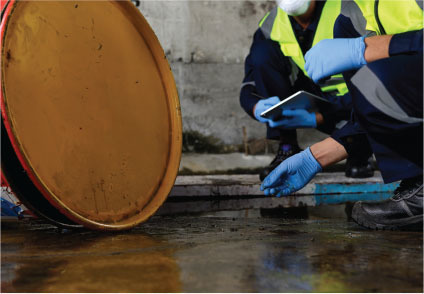January/February 2014
ON ETHICS: YOU BE THE JUDGE
A Leak in Judgment?
An engineer is requested to provide expert testimony regarding a familiar work site.
The Situation
Ren Tierre has a water leakage problem in a building owned by L. Andlorde and hires Nancy Gineer, P.E., to perform a basement inspection to determine the cause of the leakage. Andlorde had earlier hired Jim Contractor to install a sump pump in connection with a previous leakage issue. Gineer determines that the leakage is due to run off from an adjacent parking garage. She recommends a series of design and construction solutions to address the leaks and presents the report to her client, Tierre. The report briefly mentions Contractor’s earlier work to install the sump pump, but is not critical of that work.
Ultimately, Tierre, with the landlord’s consent, agrees to have Vince Smith, P.E., develop an engineering solution. The work is completed and the leakage issues are successfully addressed. Later, Contractor’s attorney contacts Gineer in an effort to retain her as an expert witness in connection with litigation between Contractor and Andlorde relating to the original sump pump work performed for Andlorde.
What Do You Think?
Would it be ethical for Nancy Gineer to perform the expert witness work for Contractor?
What the Board of Ethical Review Said
Expert witness testimony by an engineer often raises important ethical considerations. Questions of confidentiality, conflicts of interest, scope of practice, competence, and other ethical considerations frequently come into play when expert witness testimony is the focus of a professional practice issue.
The Board can find nothing specific in the NSPE Code of Ethics or previous NSPE Board of Ethical Review opinions that would suggest Gineer could not perform the work in question for Contractor. The only potential ethical issues for consideration relate to language in NSPE Code Sections II.4 and III.4.b that require an engineer 1) to “act for each employer as faithful agents or trustees” and 2) to obtain the permission of an “interested party” when representing adversarial interests in connection with a specific project.
Under the facts of the case, since Gineer was never retained by Andlorde, it would be difficult to make a plausible case that Andlorde was in fact an “interested party” in the strictest sense of the term, which would require Gineer to obtain Andlorde’s permission before performing services for Contractor. While the building in question was owned by Andlorde, Gineer’s client had been Tierre. Andlorde did not share any confidential information with Gineer.
Moreover, one must assume that as the contractor for Andlorde, Contractor has access to the same if not more information about the building than did Gineer. While Andlorde may have been, at best, an incidental beneficiary of Gineer’s services (and arguably a potential adversary of Tierre in the event of a dispute between the tenant and landlord over the leakage issue), it does not appear, under the facts, that Gineer owed any ethical obligation to Andlorde. Therefore, Gineer would be free to pursue a professional relationship with Contractor.
Conclusion
It would be ethical for Nancy Gineer to perform the expert witness work for Contractor.
NSPE Code References
Section II.4: Engineers shall act for each employer or client as faithful agents or trustees.
Section III.4.b: Engineers shall not, without the consent of all interested parties, participate in or represent an adversary interest in connection with a specific project or proceeding in which the engineer has gained particular specialized knowledge on behalf of a former client or employer.
For more information, see BER Case No. 10-11.


 Volunteering at NSPE is a great opportunity to grow your professional network and connect with other leaders in the field.
Volunteering at NSPE is a great opportunity to grow your professional network and connect with other leaders in the field. The National Society of Professional Engineers (NSPE) encourages you to explore the resources to cast your vote on election day:
The National Society of Professional Engineers (NSPE) encourages you to explore the resources to cast your vote on election day:


